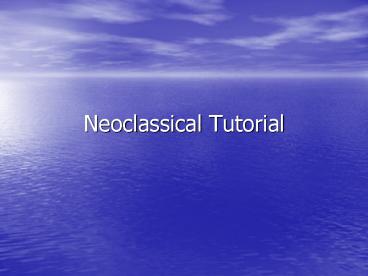Neoclassical Tutorial - PowerPoint PPT Presentation
1 / 9
Title:
Neoclassical Tutorial
Description:
Neoclassical Tutorial History Behind Neoclassicism What is important for you to know about the Neoclassical Period is that it was a time when the social order was ... – PowerPoint PPT presentation
Number of Views:71
Avg rating:3.0/5.0
Title: Neoclassical Tutorial
1
Neoclassical Tutorial
2
History Behind Neoclassicism
- What is important for you to know about the
Neoclassical Period is that it was a time when
the social order was undergoing great change. - The middle class was rising in power and
prestige. - The creation of new wealth through trade was
challenging established hierarchies. - And the idea of the "divine right of kings" (that
kings were authorized to rule as God's
representatives on earth) was losing its hold as
the rule of kings became more precarious. - In 1649, for example, Charles I, King of England,
was beheaded and his throne became the
Commonwealth under Oliver Cromwell. - At the end of the Neoclassical period we see the
American and French Revolutions.
3
The Reformation
- There were challenges to religious authority as
well. - Oliver Cromwell and the Puritans were ousted in
England as Charles II regained the throne in
1660. - The Restoration of Charles II to the throne led
to a new age of bawdiness in theatre, dress, and
literature, a reaction to Puritan insistence on
plainness and seemliness.
4
Historical Events Affecting Neoclassical Thought
- Other important events affecting the period
include - the Copernican Revolution in the Sixteenth
Century (man learns he is not, in fact, the
center of the universe, which has enormous
ramifications regarding religious belief) - the Cartesian Revolution of the Seventeenth
Century - Rene Descartes writes, "I think, therefore I
am," which brings into question any attempt to
view the world objectively and initiates a new
emphasis on subjectivity.
5
Effects of Literature
- In literature, the "endless flux of event and
feeling" which people were experiencing in the
midst of such massive social change was reflected
in a new emphasis on strict conventions and
forms. - As a result, the literature of the period may
sometimes seem stylized to the modern reader, and
not many students will consider this their
favorite period of literary history.
6
Now and Then
- The biggest differences between the Neoclassical
assumptions about reality and those common to our
age include - to Neoclassical minds, natural passions aren't
necessarily good natural passions must be
subordinated to social needs and strictly
controlled. - social needs are more important to Neoclassical
society than individual needs. - This conflicts with our modern preoccupation with
the individual in our time, the needs of the
individual tend to be considered the most
important, but this wasn't true in the
Neoclassical period.
7
Order Rules
- Neoclassical thinkers believed that man could
find meaning in order itself in the order of - Nature
- social hierarchies
- Government
- Religion
- Even in the order within literary forms.
8
Neoclassical Thought
- Writers of the period often turned to the
classical past for stability and the order they
craved, both of which were threatened. - With all of these ideas, it is important to
remember that we're only talking about a very
narrow segment of society (mostly the upper-class
who are literate or whose lives were recorded in
some way). - We are also talking primarily about a relatively
small portion of the world, mostly England and
France.
9
Religion
- In religion, there was a search for natural law,
for something beyond kings and individual
subjective experience in an attempt to stabilize
existence. - Deism emerged as a dominant religious philosophy
of the period, emphasizing ideas about God as the
Great Planner or Watchmaker who assembles the
universe, winds it up, and then leaves it ticking
away on its own without interfering in its
day-to-day operations. - The ideas of an impersonal God and a logical
universe are central to Deism. - Many of the early founders of the United States,
including Thomas Jefferson, were deists. - Deists tend to equate morality itself with reason
and logic.































